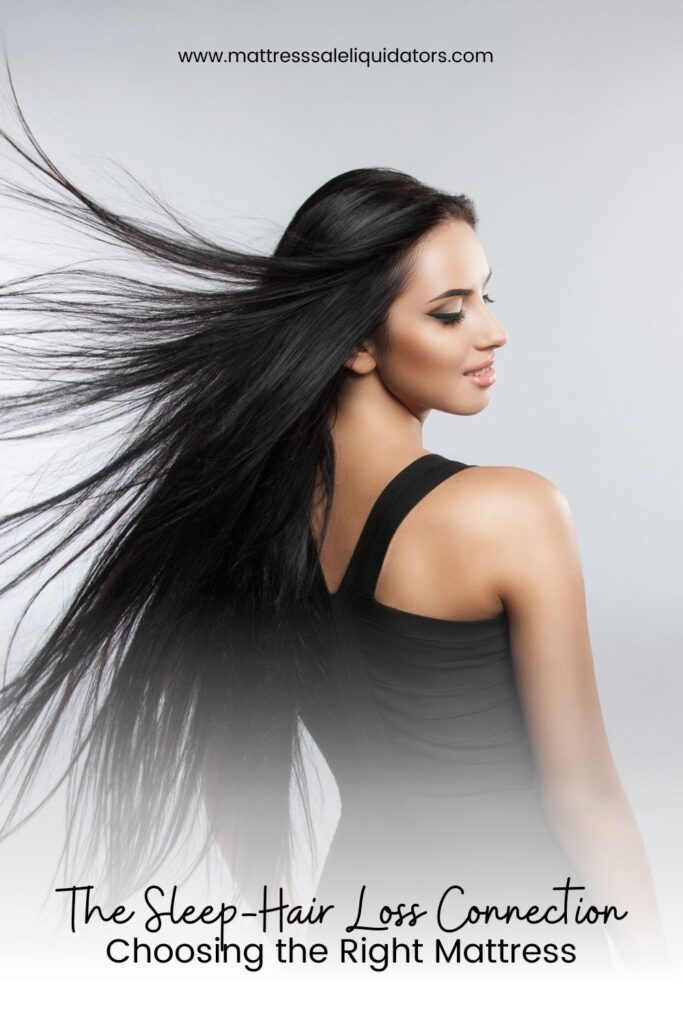When it comes to our health and well-being, sleep plays a crucial role. From restoring our energy to supporting healthy bodily functions, sleep is vital. But can lack of sleep also lead to hair loss? This article will delve into the connection between sleep and hair health, dispel common myths, and provide useful tips for selecting the perfect Orange County mattress to improve your sleep quality.

Understanding the Relationship
The Role of Sleep:
Sleep is a time for our bodies to repair and rejuvenate. It affects numerous bodily functions, including hormone regulation, immune system support, and hair growth.
Hormones and Hair Loss:
Hormonal imbalances caused by inadequate sleep can disrupt the natural hair growth cycle, leading to increased shedding or slower hair regrowth.
Stress and Sleep Deprivation:
Lack of sleep raises stress levels, triggering hair loss conditions like telogen effluvium, where hair prematurely enters the resting phase.
Debunking the Myths
Sleeping on a Hard Surface Prevents Hair Loss:
There is no evidence to suggest that the firmness of a mattress directly affects hair loss. Hair loss is primarily influenced by internal factors such as genetics, hormones, and overall health.
Lack of Sleep Leads to Permanent Hair Loss:
Temporary hair loss caused by sleep deprivation can be reversed once healthy sleep patterns are restored. However, chronic hair loss may be indicative of underlying conditions and requires medical attention.
Sleeping Position Determines Hair Loss:
While certain hairstyles and sleep positions may contribute to hair breakage, they do not directly cause hair loss. Focusing on sleep quality and overall health is more important for hair preservation.
Tips for Choosing a Suitable Mattress
Here are factors to keep in mind while you browse the Orange County mattress sale.
Consider Your Sleep Style:
Determine whether you sleep on your back, side, or stomach, as this influences the ideal mattress firmness and support level.
Assess Material and Comfort:
Choose a mattress material that suits your preferences, such as memory foam, latex, or innerspring. Test mattresses in-store or research online reviews to ensure optimal comfort.
Support and Alignment:
Look for a mattress that promotes proper spinal alignment and evenly distributes your body weight, reducing pressure points.
Temperature Regulation:
Opt for mattresses with cooling properties, such as gel-infused memory foam or breathable covers, to prevent overheating during sleep.
Motion Isolation:
If you share the bed, consider a mattress that minimizes motion transfer, ensuring uninterrupted sleep for you and your partner.
Durability and Warranty:
Look for mattresses with extended warranties, indicating their longevity and durability.
Personal Preferences:
Lastly, trust your comfort and personal preferences when selecting a mattress. Spend time researching and testing options to find the perfect fit for you.
Conclusion
While lack of sleep can indirectly contribute to hair loss by affecting hormone levels and increasing stress, it is not the sole cause. Prioritizing healthy sleep patterns and choosing the right mattress can significantly improve your overall well-being, including your hair health. Remember, a good night’s sleep on your Orange County mattress is invaluable for a healthier, happier you.
